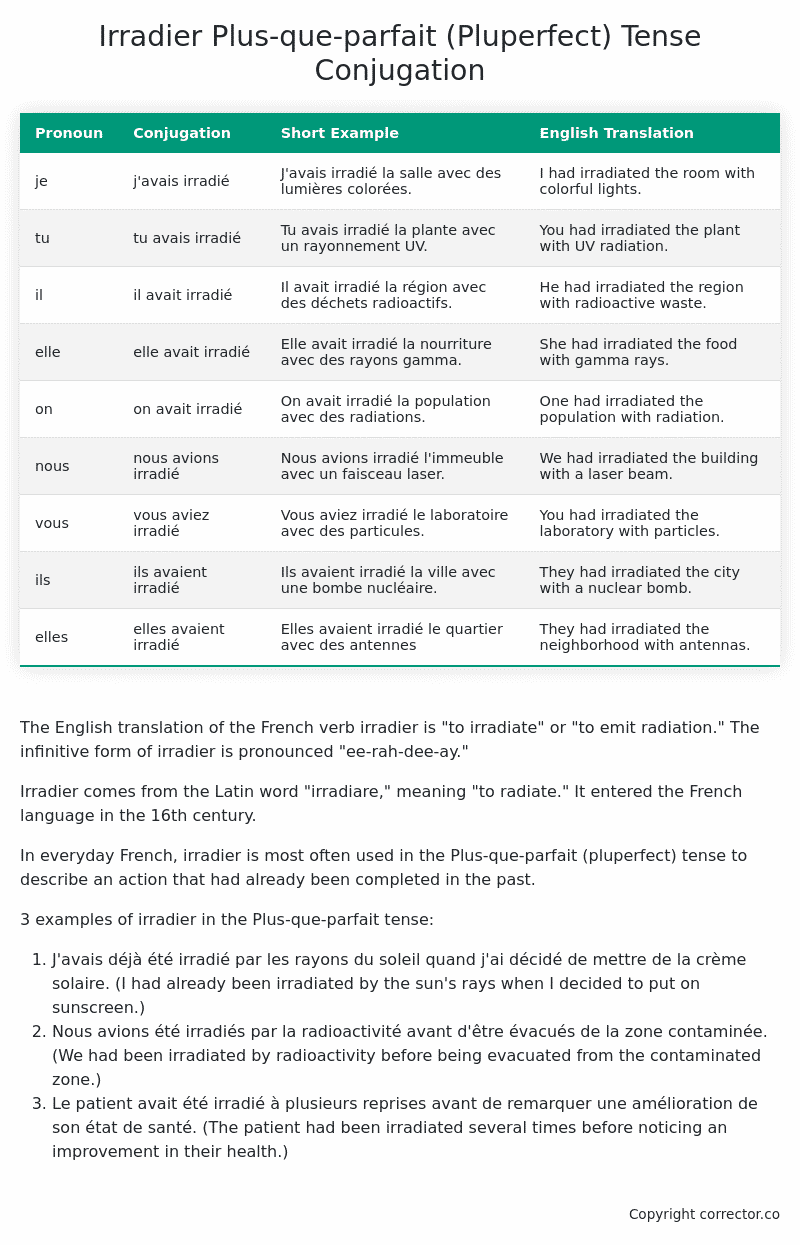Plus-que-parfait (Pluperfect) Tense Conjugation of the French Verb irradier
Introduction to the verb irradier
The English translation of the French verb irradier is “to irradiate” or “to emit radiation.” The infinitive form of irradier is pronounced “ee-rah-dee-ay.”
Irradier comes from the Latin word “irradiare,” meaning “to radiate.” It entered the French language in the 16th century.
In everyday French, irradier is most often used in the Plus-que-parfait (pluperfect) tense to describe an action that had already been completed in the past.
3 examples of irradier in the Plus-que-parfait tense:
- J’avais déjà été irradié par les rayons du soleil quand j’ai décidé de mettre de la crème solaire. (I had already been irradiated by the sun’s rays when I decided to put on sunscreen.)
- Nous avions été irradiés par la radioactivité avant d’être évacués de la zone contaminée. (We had been irradiated by radioactivity before being evacuated from the contaminated zone.)
- Le patient avait été irradié à plusieurs reprises avant de remarquer une amélioration de son état de santé. (The patient had been irradiated several times before noticing an improvement in their health.)
Table of the Plus-que-parfait (Pluperfect) Tense Conjugation of irradier
| Pronoun | Conjugation | Short Example | English Translation |
|---|---|---|---|
| je | j’avais irradié | J’avais irradié la salle avec des lumières colorées. | I had irradiated the room with colorful lights. |
| tu | tu avais irradié | Tu avais irradié la plante avec un rayonnement UV. | You had irradiated the plant with UV radiation. |
| il | il avait irradié | Il avait irradié la région avec des déchets radioactifs. | He had irradiated the region with radioactive waste. |
| elle | elle avait irradié | Elle avait irradié la nourriture avec des rayons gamma. | She had irradiated the food with gamma rays. |
| on | on avait irradié | On avait irradié la population avec des radiations. | One had irradiated the population with radiation. |
| nous | nous avions irradié | Nous avions irradié l’immeuble avec un faisceau laser. | We had irradiated the building with a laser beam. |
| vous | vous aviez irradié | Vous aviez irradié le laboratoire avec des particules. | You had irradiated the laboratory with particles. |
| ils | ils avaient irradié | Ils avaient irradié la ville avec une bombe nucléaire. | They had irradiated the city with a nuclear bomb. |
| elles | elles avaient irradié | Elles avaient irradié le quartier avec des antennes | They had irradiated the neighborhood with antennas. |
Other Conjugations for Irradier.
Le Present (Present Tense) Conjugation of the French Verb irradier
Imparfait (Imperfect) Tense Conjugation of the French Verb irradier
Passé Simple (Simple Past) Tense Conjugation of the French Verb irradier
Passé Composé (Present Perfect) Tense Conjugation of the French Verb irradier
Futur Simple (Simple Future) Tense Conjugation of the French Verb irradier
Futur Proche (Near Future) Tense Conjugation of the French Verb irradier
Plus-que-parfait (Pluperfect) Tense Conjugation of the French Verb irradier (this article)
Passé Antérieur (Past Anterior) Tense Conjugation of the French Verb irradier
Futur Antérieur (Future Anterior) Tense Conjugation of the French Verb irradier
Subjonctif Présent (Subjunctive Present) Tense Conjugation of the French Verb irradier
Subjonctif Passé (Subjunctive Past) Tense Conjugation of the French Verb irradier
Subjonctif Imparfait (Subjunctive Imperfect) Tense Conjugation of the French Verb irradier
Subjonctif Plus-que-parfait (Subjunctive Pluperfect) Tense Conjugation of the French Verb irradier
Conditionnel Présent (Conditional Present) Tense Conjugation of the French Verb irradier
Conditionnel Passé (Conditional Past) Tense Conjugation of the French Verb irradier
L’impératif Présent (Imperative Present) Tense Conjugation of the French Verb irradier
L’infinitif Présent (Infinitive Present) Tense Conjugation of the French Verb irradier
Struggling with French verbs or the language in general? Why not use our free French Grammar Checker – no registration required!
Get a FREE Download Study Sheet of this Conjugation 🔥
Simply right click the image below, click “save image” and get your free reference for the irradier Plus-que-parfait tense conjugation!

Irradier – About the French Plus-que-parfait (Pluperfect) Tense
Tense Formation
Common everyday usage patterns
Sequencing of past events
Background information
Hypothetical or reported speech
Interactions with other tenses
Summary
I hope you enjoyed this article on the verb irradier. Still in a learning mood? Check out another TOTALLY random French verb conjugation!


